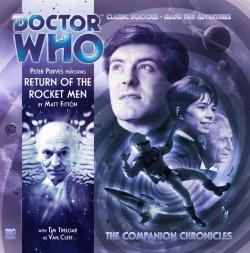Return of the Rocket Men (Big Finish)
Sunday, 24 March 2013 - Reviewed by

Return of the Rocket Men
Big Finish Productions
Written by Matt Fitton
Directed by: Lisa Bowerman
Released November 2012
Steven’s abrupt departure from Doctor Who in The Savages is the starting point for Return of the Rocket Men. It takes this disappointing exit and attempts to give it context and emotional resonance, two things that companion exits were often lacking during this period of the show, when characters were frequently and unceremoniously dumped.
One of the most successful previous attempts at fleshing out the emotional side of 60s companions was John Dorney’s The Rocket Men, which this story is a sequel to. That story is one of the most structurally complex and emotionally rewarding plays in The Companion Chronicles range. In invoking that previous work, writer Matt Fitton has given himself a lot to live up to.
In The Rocket Men Dorney focused on Ian’s love for Barbara, something that was never really addressed in the series, but has been a long-favourite fan theory about the characters. In writing a sequel Matt Fitton not only takes on that play’s titular villains (more on them later), but also it’s commitment to strong, character-based drama, using Steven’s departure in the same way as Ian’s feelings for Barbara. The problem is that the emotional hook of Steven’s decision to leave is far less engaging than Ian’s love for Barbara. As the first companions Ian and Barbara have an iconic status that Steven does not. While it’s nice to have Steven’s departure given more context, it’s just not as interesting.
Despite having a weaker starting point than The Rocket Men, the play does manage to give a satisfying level of depth to Steven’s exit. No mean feat given that his departure was so vapid and perfunctory. In doing so Fitton returns to Steven’s origins as a pilot and the character development we have already seen in The Companion Chronicles (notably in the Oliver Trilogy). While this was probably intended to feel like a culmination of threads from previous plays it does feels a little repetitive. The Cold Equations also had Steven’s piloting experience as the crux of the story, and it (along with the stories either side of it) also had him reflecting on the deaths of Katarina, Sara and Oliver. This isn’t to say that it isn’t engaging and well written, it’s just that it doesn’t give the character or The Companion Chronicles anything new.
One of the things that made The Rocket Men work so well was the clever way it used narrative perspective, telling the story non-chronologically, with flashes in the past and future slowly revealing more about how the situation in the present would be resolved. While Return of the Rocket Men does have a certain ‘timey-wimeyness’ (as the new series would put it), the play’s structure is disappointingly straightforward. This isn’t to say that every play in the range needs to be wildly experimental, but it does beg the question of why you would chose to invoke one of the most complex and well received plays in something which shows such little ambition.
There is also the question of why Fitton decided to use the titular villains in this story at all. In their first story they were clearly intended as a pastiche, both of 1940s sci-fi serials and the kind of pulp-inspired villains which often appeared in the early years of Doctor Who. Here however, they are presented as violent, thuggish mercenaries, their roots all but forgotten. The main genre being played with here is the Western, with the ‘pioneer’ colonist staving off an attack by bandits, and the Rocket Men don’t really fit with this setting terribly well. One of them is even given a bizarre fondness for archaic hand-guns in a clumsy attempt to tie the Rocket Men better to the setting. An original creation might have worked better.
All this may make it sound like I didn’t like this play, but that isn’t true. It’s a very solid piece from a strong writer. It’s just that it pales in comparison to it’s predecessor, The Rocket Men, and would undoubtedly work better as a play in it’s own right, rather than being a sequel. The comparison just draws attention to its shortcomings and lack of originality. With the recent announcement that The Companion Chronicles will be coming to an end after Series 8, it would be nice if they could find ways to use the characters in new ways and push the actors in new directions, rather than going over old ground in solid, but underwhelming releases like this.





